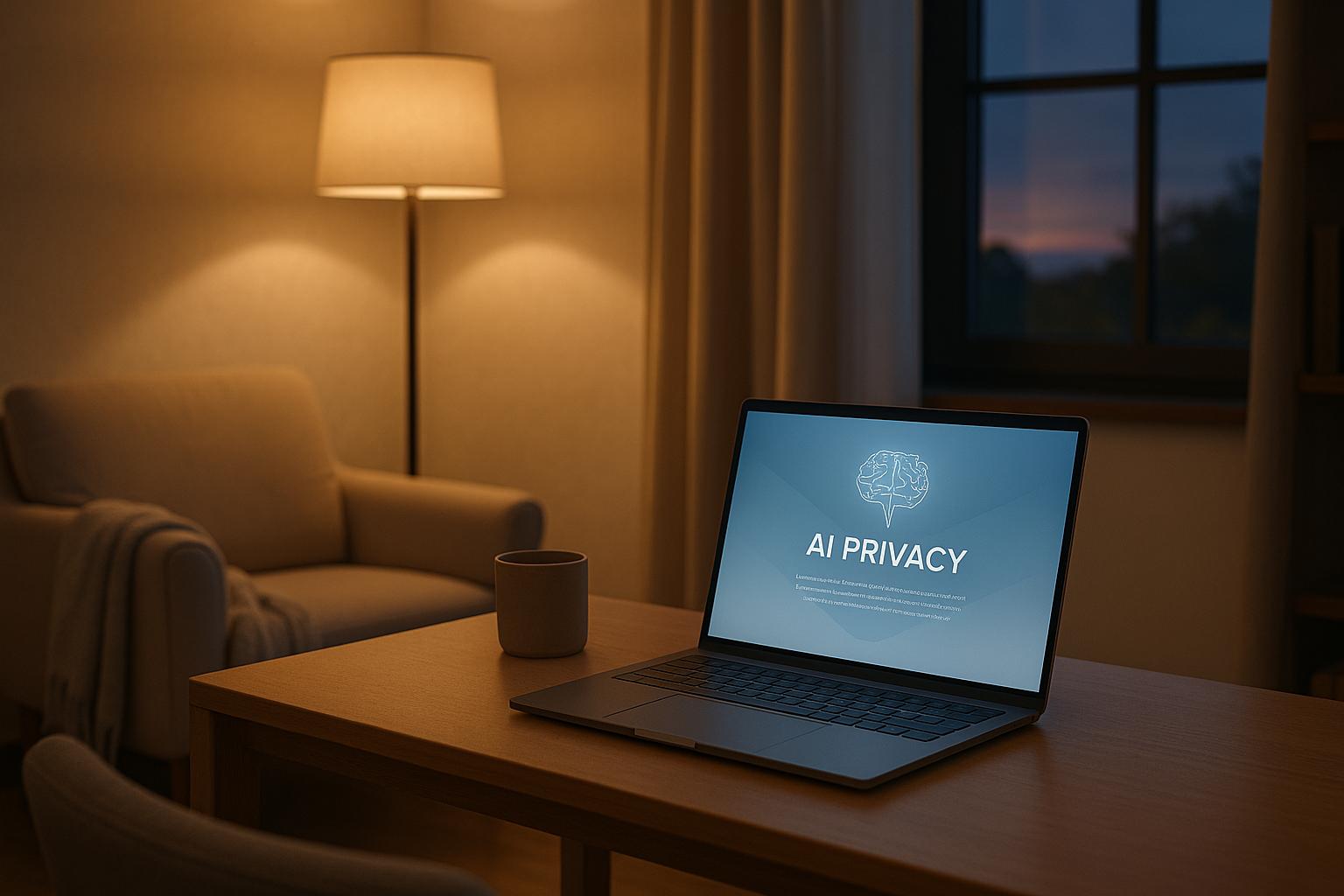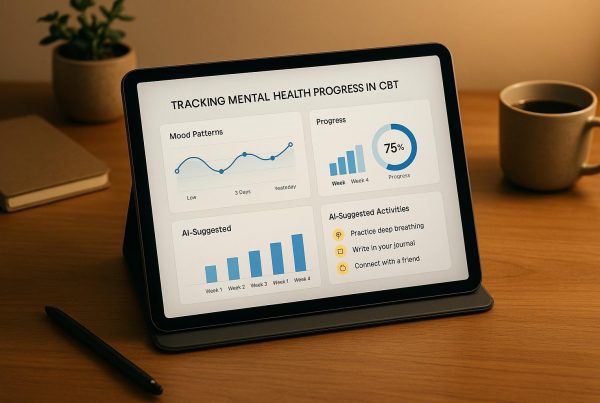AI tools are transforming mental health crisis response by analyzing sensitive data like texts, voice patterns, and biometrics to detect distress. But this progress raises urgent privacy concerns. Balancing fast crisis intervention with protecting personal data is challenging but essential. Key privacy risks include improper data sharing, storage vulnerabilities, and algorithm bias. Solutions like automated data deletion, local processing, and compliance with privacy laws (e.g., GDPR, HIPAA) are being implemented to safeguard user trust. Ensuring privacy while delivering effective support is critical to advancing mental health care.
AI Posing as Mental Health Experts? Why Privacy Pros Should Be Paying Attention
Key Privacy Risks in AI Mental Health Systems
AI-driven mental health systems offer powerful tools for crisis response, but they also come with privacy challenges. These platforms handle deeply sensitive personal information, making robust data protection measures essential.
Data Sharing During Emergencies
In emergencies, the need for immediate action often takes precedence over strict privacy protocols, which can lead to unintended exposure of sensitive data.
Some key challenges include:
- Consent Challenges: In urgent situations, obtaining proper consent or documenting the sharing of information often becomes impractical.
- Over-sharing Risks: Systems may unintentionally disclose more data than necessary to address the crisis.
- Incomplete Records: Emergency responses can result in gaps in documenting what data was shared and with whom.
While rapid intervention is critical, these scenarios highlight the importance of balancing efficiency with privacy safeguards. Beyond data sharing, the way information is stored also requires attention.
Data Storage Security Issues
Stored data in AI mental health systems is another area of concern, as it remains vulnerable to various security threats. Here’s a breakdown of common risks and potential solutions:
| Security Risk | Potential Impact | Suggested Mitigation |
|---|---|---|
| Data Breaches | Exposure of sensitive mental health details | Implement end-to-end encryption |
| Unauthorized Access | Breach of confidential therapy records | Use multi-factor authentication |
| Cyber Attacks | Theft of private user information | Conduct regular security audits |
| System Vulnerabilities | Exploitation of software flaws | Perform continuous system monitoring |
These measures help ensure that sensitive information remains protected against external threats.
Private Session Options
To address privacy concerns, many modern AI mental health platforms have introduced features that give users more control over their data. For example, Aidx.ai offers an Incognito Mode that automatically deletes session data after 30 minutes, reducing the risk of long-term exposure. Other privacy-focused features include:
- Automated Data Deletion: Systems that erase session data after a set period to minimize retention risks.
- Local Data Processing: Processing sensitive information directly on user devices, avoiding remote servers whenever possible.
- Encrypted Data Storage: Using advanced encryption methods for any data that must be stored.
- User Control: Allowing individuals to decide what information is stored, shared, or deleted.
As of February 2025, about 25% of U.S. internet users are using healthcare apps [2]. With states like New Mexico and Vermont introducing new health privacy legislation, AI mental health platforms must stay ahead by continuously improving their privacy measures. These efforts are vital to maintaining user trust, which is the cornerstone of effective mental health support systems.
AI Bias in Emergency Response
As AI systems become more integral to identifying mental health crises, the issue of bias in these algorithms poses a serious threat to fair and effective care.
Accuracy Gaps Across Groups
AI models often falter when trained on datasets that don’t adequately represent diverse populations. A 2024 study [5] revealed that while AI classifiers reached 85% accuracy during training, their performance dropped significantly in real-world scenarios, landing between 68% and 73%.
| Population Group | Common AI Bias Issues | Impact on Crisis Detection |
|---|---|---|
| Racial Minorities | Misinterpretation of cultural expressions | Delayed or missed interventions |
| LGBTQ+ Individuals | Limited recognition of specific distress signals | Under-identification of crisis situations |
| Neurodivergent Users | Difficulty interpreting non-standard communication patterns | Higher rates of false negatives |
These disparities raise ethical concerns, especially regarding privacy violations and the erosion of trust. When individuals perceive the system as unreliable, they may withhold critical information, further undermining the effectiveness of crisis detection [3].
Prediction Error Effects
AI bias isn’t the only challenge – prediction errors also jeopardize crisis response. Two types of errors stand out:
False Positives:
- Trigger unnecessary emergency interventions
- Increase stigma and emotional distress
- Undermine trust in AI-driven care
False Negatives:
- Result in missed life-saving interventions
- Delay access to essential care
- Put patients’ safety at risk
Organizations like the American Psychological Association are stepping in to address these issues [4]. Their efforts include:
- Conducting regular bias audits on AI systems
- Requiring transparent reporting of performance across demographic groups
- Advocating for human oversight in AI-assisted crisis detection
To tackle these challenges, developers are refining algorithms to better reflect empathy and understanding. This includes ongoing bias monitoring and incorporating more diverse data sources to improve accuracy for all groups [5].
sbb-itb-d5e73b4
Privacy Protection Methods for Crisis AI
When dealing with sensitive crisis data, ensuring user privacy while maintaining effective emergency response capabilities is no small task. To address these challenges, three primary methods have been developed, focusing on the data lifecycle and meeting regulatory demands.
Automated Data Removal
Crisis AI systems often rely on automated protocols to manage sensitive information. These systems ensure that data is erased after a crisis event, following predefined timelines. For instance, time-based triggers automatically delete crisis-related conversations after a set period, while selective retention keeps only critical medical details. Additionally, automated audit trails record every deletion, providing transparency and accountability.
Local Data Processing
To further reduce privacy risks, local data processing plays a critical role. By using techniques like federated learning, these systems process data directly on user devices rather than transmitting it to centralized servers. This approach cuts exposure risks by up to 85% compared to traditional methods [3].
| Processing Type | Privacy Benefits | Implementation Challenges |
|---|---|---|
| Device-Level Computing | Keeps data on the user’s device | Limited processing power |
| Edge Processing | Minimizes data transmission | Higher costs |
| Hybrid Systems | Balances privacy and functionality | Requires complex coordination |
Privacy Law Requirements
Legal frameworks like GDPR and HIPAA add another layer of protection, ensuring that technical measures are backed by enforceable rules. To comply with these regulations, AI platforms must adopt practices such as:
- Data Encryption: Protecting sensitive information during storage and transmission.
- Access Controls: Strictly limiting who can access user data.
- Breach Notifications: Reporting any privacy violations promptly, as required by law.
The urgency of building privacy-conscious AI systems becomes even more apparent when considering mental health statistics. Research from The Lancet Psychiatry reveals that half of the global population may experience at least one mental disorder by age 75 [5]. Meanwhile, the World Health Organization predicts that mental disorders will top the global disease burden by 2030 [5]. These figures highlight the growing need for AI systems that can handle increased demand while safeguarding user confidentiality.
Conclusion: Balancing AI Crisis Response and Privacy
Integrating AI into mental health crisis response means finding a careful balance between providing immediate help and safeguarding user privacy. With growing concerns about health data security, AI mental health platforms are prioritizing advanced privacy measures to protect sensitive information.
A privacy breach in this context can have serious repercussions – causing emotional harm or discouraging individuals from sharing crucial details, which could negatively impact their treatment [3]. To tackle these issues, many platforms are adopting layered privacy strategies. For instance, Aidx.ai demonstrates compliance with GDPR by using automated data deletion and strong encryption protocols. This approach is essential for maintaining user trust while delivering timely crisis interventions.
During the American Psychological Association’s meeting with federal regulators in February 2025, the urgency of establishing robust privacy standards for AI mental health tools was a central focus [4]. This has led to advancements in key privacy measures, such as:
| Privacy Requirement | Implementation Approach | Impact on Crisis Response |
|---|---|---|
| Data Encryption | Secures information during both transmission and storage | Protects sensitive data while enabling immediate support |
| Automated Deletion | Removes sensitive data after a set period | Preserves confidentiality after the crisis is resolved |
| Access Controls | Limits who can view user data | Balances privacy with the need for emergency intervention |
As these systems continue to develop, the emphasis must remain on protecting user trust without compromising the ability to provide fast, effective support. Strong data protection practices not only safeguard users but also encourage them to seek help when they need it most [1].
The future of AI in mental health crisis response hinges on maintaining this delicate balance. Ensuring both accessibility and privacy is critical to advancing effective crisis management while respecting user confidentiality.
FAQs
How does AI protect user privacy during mental health emergencies while ensuring timely support?
Aidx.ai places a strong emphasis on protecting user privacy. It adheres to GDPR regulations, employs end-to-end encryption, and guarantees that no human oversight occurs unless legally mandated. For those seeking extra confidentiality, users can enable Incognito Mode, which erases session data automatically after 30 minutes.
These privacy-focused features ensure that Aidx.ai delivers quick and reliable support when it matters most, all while safeguarding your personal information.
How are AI systems addressing algorithm bias in mental health crisis interventions?
Addressing algorithm bias in AI mental health systems involves several important strategies. One approach is using diverse and representative datasets during the training process. This helps minimize the likelihood of biased responses by ensuring the AI reflects a broader range of experiences and perspectives.
In addition, regular audits and testing play a crucial role in spotting and fixing unintended biases. These ongoing evaluations help maintain the system’s reliability and fairness over time.
Another key method involves incorporating dynamic algorithms that adjust based on user feedback and interaction trends. These systems are built to adapt and improve, ensuring they provide fair and consistent support to individuals from all backgrounds. By focusing on openness and equity, AI systems strive to offer more dependable and inclusive mental health solutions.
How do privacy laws like GDPR and HIPAA influence the design and use of AI-driven mental health platforms?
Privacy laws like GDPR (General Data Protection Regulation) and HIPAA (Health Insurance Portability and Accountability Act) are key to shaping how AI-powered mental health platforms are built and used. These regulations are designed to ensure that sensitive data, such as mental health records, is handled securely and responsibly.
To meet these requirements, platforms must use strong data encryption, restrict access to personal information, and give users control over their data. For instance, GDPR mandates clear consent for data collection and allows users to delete their personal information, while HIPAA focuses on safeguarding health-related data in the U.S. Following these regulations doesn’t just protect user privacy – it helps build confidence in AI-based mental health tools.



